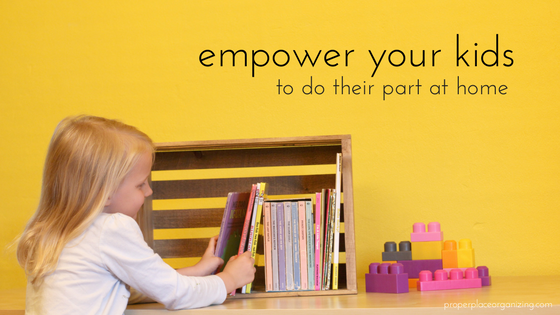On a daily basis, women are contending with the clutter of soccer cleats, backpacks, and farm magazines. They almost never get to experience a clean house for more than a few short minutes. “If I lived alone it might be easier to stay organized!” It’s easy to blame the disorganization on others in the household; to point fingers that the children don’t put items away. It is possible that others are guilty, but everyone in the household is a part of the problem, and the solution!
Organize with your kids in mind
We know that not everyone has the same talents in sports nor the same strengths in school. Each person approaches situations with their own creative ideas. This is the same for organizing in the household, everyone has their own approach. Mothers: you can’t expect your children to organize the same way their siblings do, nor the same way you do. You wouldn’t expect them all to be skilled in soccer, would you?
Each child has an individual set of skills, even when it comes to organizing.
Mothers can easily get frustrated with their kids with the house upkeep. They can especially feel defeated when they’ve worked hard to organize or purge an area and the kids appear to have no respect for the effort, and destroy the order in a matter of days [or minutes!].
I’m a firm believer that kids can help organize and maintain the house even by the age of three. Teach them how to put clothes away, put their dishes in the sink, and keep shoes in the correct bin. Children are like adults: we need structure and discipline to keep us moving forward and accountable. Kids need help implementing and learning, and you can support them along the way, even if you don’t feel capable with your own organization. Having everyone involved in the household will actually give you more personal accountability to maintain order.
You are capable + lead by example
Take analysis of each member of the household as an individual, rather than grouping everyone together. Consider what would be the best for each person if they had their own “zones” for living. Start simple per child, and then brainstorm how the big picture of the household fits together. Enlist the child to help brainstorm the ideas that could work best for him/her. This will give them much more buy-in than being told what to do.
Since each child is different, here are organizing ideas and perspectives for the child who is:
The SAVER
Many kids who save every little trinket react because they think their items will be thrown away or not valued. They may not feel they have much that is their own, so they keep what they can have control over [i.e. siblings who share everything] Designate a place to display their favorite masterpiece for the week. Replace it each week, or as needed, with a new piece of art they’ve made. At the end of the quarter, they can pick two items to save in their memory file. At the end of the year, they have 8-10 pieces of art to keep long term. A small “treasure box” that’s labeled gives them freedom to keep what they want, but limited to only what fits in the box.
The MESSY kid
Most kids are messy to some extent. They have no regard for space and other people. This child needs structure that is loose, but very clear. Don’t try to make them keep everything in order, but general order is required. For example, have a basketball hoop above the hamper so they have to make a shot for their dirty laundry, have a chore chart for them to work off so they can do it on their own pace, have incentives for meeting expectations. Some children aren’t messy by nature, they simply don’t know any better. Give them guidance with labels and clear expectations.
The PRECISE kid
Many mothers wish their kids were organized and don’t need to be nagged to pick up their rooms. But, it’s important to keep an eye on the child who is overly structured on their own. It’s good to give them structure like everyone else in the house, but it’s also important to help them continue being a child. The natural pressure certain kids put on themselves can be a mental battle they will fight for years [I know, I was one of them!].
The OBLIVIOUS kid
The nature of being ignorant: we don’t know what we don’t know. Give the child a clear picture of what the expectations are for their role in the household. Give them ownership in the home. Don’t let them have an excuse because they are oblivious. Show them how to participate and teach them how to be involved. Chore charts give guidance and the gift of earning/losing privileges makes them aware.
The BUSY kid
As children get older they get busier with their own extracurricular activities. Life gets busier for everyone as the children get older. Determine how their household expectations will adjust as their schedule changes. As they become adults it’s important to learn the lesson of balance and planning ahead. The tasks in the house stay the same regardless of how busy people get, so the parents needs to determine if/how adjustments need to be made as the schedules change.
General, organizing tips for kids:
- Store items at their height so they can access and put away without your help
- Use hooks instead of hangers so they can hang backpacks and jackets on their own
- Use images of items for labels if they can’t read
- Limit using lids on containers. Lids minimize the likelihood of putting items away where they belong.
- Keep kids cups and plates in cupboards at their level so they can help unload the dishwasher, set the table, etc.
- Keep the organization of their toys very simple and age appropriate. Depending on their age, they need broad categories such as red toys and blue toys, or toys with wheels and toys you build.
- Have a system for chores so they can be proactive and you don’t have to always be guiding them.
- Take 10 minutes each night for the entire family to help pick up the house and get things in order.
Regardless of the children’s organizing strengths and weaknesses, the entire family is accountable for the space. Will you choose to include them in it? If you take it all on yourself, you will always be battling uphill as the martyr. Don’t fight an uphill battle alone. Enlist the army to support you!
They learn by watching.

side note:
Some may be resonating with this, and others may be rolling their eyes that kids wont just “do it.” Yes, there is trial and error and give and take and each situation is different. So approach each situation with common sense. I’m not here to tell you how to parent, but I encourage you to be aware that issues may go deeper than organization, such as mental health challenges, learning disabilities, other social variables. Assess and be aware of the bigger picture when you run into challenges.



